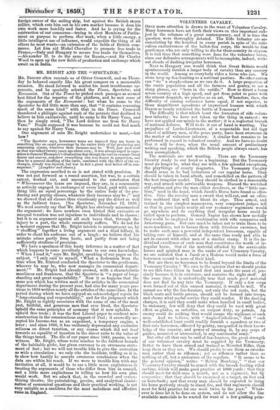MR. BRIGHT AND THE " SPECTATOR."
Banner often reminds us of Oliver Cromwell, and on Thurs- day he behaved exactly like his great compeer on a memorable occasion. He stood forward to scatter his most troublesome op- ponents, and he specially selected the Times, Spectator, and Economist. Out of the Times he picked such passages as seemed best fitted for the repartee of the platform, and he met some of the arguments of the Economist ; but when he came to the Spectator he did little more than say, that " it contains reasoning much of the same kind" with that in the Times. Cromwell thundered a philippic against each of the patriots that declined to believe in him exclusively, until he came to Sir Harry Vane, and then he simply cried, "The Lord deliver me from Sir ?ferry Vane." People su sed it was because he could not find much to say against Sir : arry Vane. One argument of ours Mr. Bright undertakes to meet,—but how ?
"The Spectator says, howsoever taxes are imposed they are borne in something like an equal percentage by the entire body of the producing and consuming classes, whatever their incomes may be. Well, just such stuff as that was talked twenty years ago about corn; it was always urged in oppo- sition to General Thompson's illustration that though the corn laws made bread dearer and scarcer, somehow everything else was dearer in proportion, and thus by a general shuffling of the cards, combined with the effect of the ex- changes, nobody was injured, but was in fact a great deal better off in con- sequence." (Laughter and cheers.)
The expression ascribed to us is not stated with precision. It was not put forward as a round assertion, but was, to a certain extent, worked out, and amounted to the conclusion that " Wheresoever the taxes are imposed, they are, in a community so actively engaged in exchanges of every kind, paid with some- thing like an equal percentage by • the entire body of the pro- ducing and paying classes, whatever their incomes may be ;" and we showed that all classes thus vicariously pay the direct as well as the indirect taxes. [See Spectator, November 12, 1859.1 We need scarcely say that Mr. Bright has obviously misconceive the argument: we have nowhere even hinted that excessive or unequal taxation was not injurious to individuals and to classes ; but it is an argument against all such taxes that, through the injury to a part, the whole community suffers. We do not for a moment suppose that Mr. Bright intends to misrepresent us, by " shuffling" together a living argument and a dead fallacy, in order to cheat his audience out of a laugh ; we believe that his mistake arises partly from haste, and partly from not being sufficiently studious of precision.
We have a specimen of this hasty inference in a matter of fact which happens to come peculiarly home to our own knowledge. " When I read it," says Mr. Bright, speaking of our paper on the subject, "I only said to myself, What a declension from the time when Mr. Rintoul conducted the Spectator to the gentleman, whoever he may be, who now manages its economical depart- ment." Mr. Bright had already avowed, with a characteristic manliness and frankness, that the Spectator is "a paper of long- standing and great respectability." Now it so happens that the same pen which has written most of the articles in the economical department during the present year, had also for many years pre- vious to 1858 written nearly all the articles of the same "class. In the period during which we have enjoyed an acknowledged repute for
long-standing and respectability," and for the judgment which Mr. Bright so rightly associates with the name of one of the most just, faithful, and generous men that ever lived, the Spectator upheld the same principles of economy that it now upholds. It upheld free trade ; it was the first Liberal paper to confront mis- construction in the conscientious support of Peel ; it avowedly ac- cepted his Income-tax as an expedient, a temporary engine, a lever ; and since 1846, it has uniformly deprecated any exclusive reliant* on direct taxation, or any course which did not tend towards an equality of taxation in the direct ratio to the value of the things taxed. The file of our paper since 1842, passim, is our witness. Mr. Bright, whose voice reaches to the furthest bounds of the habitable globe, has given currency to an erroneous state- ment of fact ; but we will not trouble him to give the correction as wide a circulation ; we only cite the incident, trifling as it is, to show how hastily he accepts erroneous conclusions when the data are within his reach. If we were to trouble him with any invitation at all, it would be to use a little more explicitness in treating the arguments of those who differ from him in council, and a little more explicitness in telling us how his own plan would work. But we admit that, in the crowded and sympa- thizing theatre, the painstaking, precise, and analytical exami- nation of economical questions and their practical working, is not very suitable as a cantilena for the most melodious and effective voice in England.


























 Previous page
Previous page